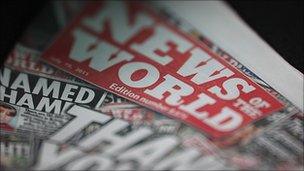The press's rival regulatory charter has 'shortcomings', says PM
- Published

Press regulation faced intense scrutiny after the phone-hacking scandal at the News of the World
A royal charter submitted by newspapers to underpin a new system of self-regulation has "serious shortcomings", Prime Minister David Cameron has said.
During Prime Minister's Questions, Mr Cameron confirmed to MPs that it would nonetheless be formally considered before the government's own plans.
The Privy Council will therefore not decide on the matter until the autumn at the earliest, the BBC understands.
Press abuse victims have called for swifter progress.
They have written to Culture Secretary Maria Miller, demanding that a royal charter promoted by the Conservatives, Lib Dems and Labour is considered next week at a meeting of the Privy Council, the body which administers royal charters.
'Fast footwork'
Mr Cameron said: "The legal advice, which we have shared with the leader of the opposition and his deputy, is that we have to take these things in order: we have to take the press's royal charter first and then we have to bring forward the royal charter on which we have all agreed."
The Privy Council is due to meet on 10 July, but will not convene again before the autumn.
Liberal Democrat peer Lord Wallace of Saltaire, a government spokesman, told Parliament on Monday it was "not appropriate for the Privy Council to consider more than one royal charter at a time on the same issue".
The Conservatives' Lord Forsyth asked him to explain how ministers "ended up second in the queue to the privy council on a matter of this importance".
"I suspect that it was the result of some very fast footwork by the press board," Lord Wallace replied.
The rival charter was submitted by the Newspaper Society, the Newspaper Publishers Association, the Professional Publishers Association and the Scottish Newspaper Society.
Hacking scandal
Ahead of a meeting with Ms Miller, campaign group Hacked Off has written to urge her to defy "a tiny if powerful vested interest".
Ministers insist they are not about to back down and approve press proposals but are, instead, following due process to avoid a battle in the courts - even if that makes further delays inevitable.
Government sources told the BBC they remain absolutely committed to implementing the package put forward by Lord Justice Leveson.
"I think the press's royal charter has some serious shortcomings so no, I haven't changed my view," the prime minister said in the Commons.
In November, the landmark Leveson report called for an independent regulatory body to be established to oversee the press, backed by legislation.
That came after the judge headed an 18-month public inquiry set up to investigate press ethics and standards in the wake of the phone-hacking scandal at the now-defunct News of the World newspaper.
Mr Cameron, Mr Miliband and Mr Clegg agreed to set up a new watchdog, external by royal charter with powers to impose million-pound fines on UK publishers and demand upfront apologies from them.
But the newspaper industry rejected the idea of "state-sponsored regulation".
There are a series of key differences between the industry's plan for press regulation and that agreed by politicians and campaigners.
The newspapers' proposals would:
Remove a ban on peers and former editors serving on the newly created "recognition panel", which will decide in future whether newspapers are being regulated properly
Remove Parliament's power to block or approve future changes to regulation. Instead the regulator, trade bodies and the recognition panel would have to agree to changes
Make it more difficult to bring group complaints
Give the regulator the power to "require", rather than "direct", the nature, extent and placement of corrections, and abandon the idea of giving it the power to force newspapers to publish apologies
Newspaper owners backed down on initial demands to have a veto over the board members of any new press regulator, accepting appointments should instead be made by "consensus".
Some owners had wanted the power to block those they saw as hostile to the press.